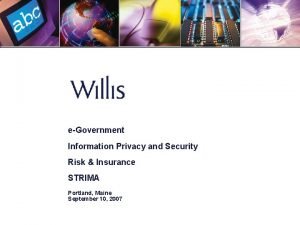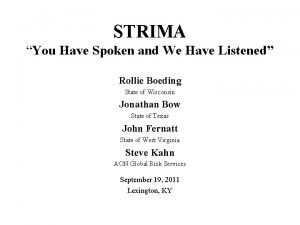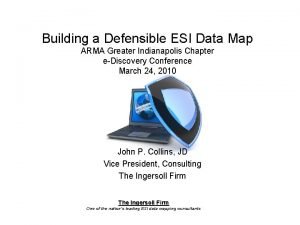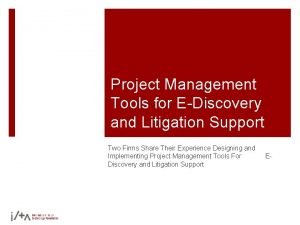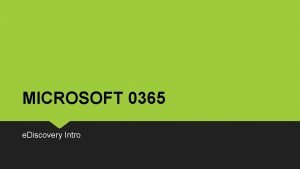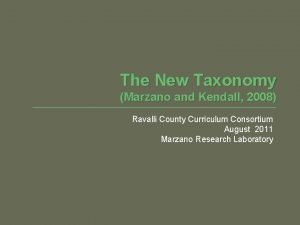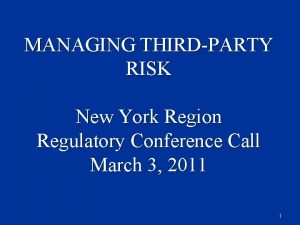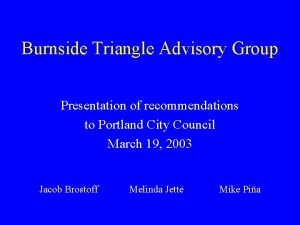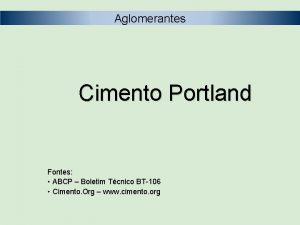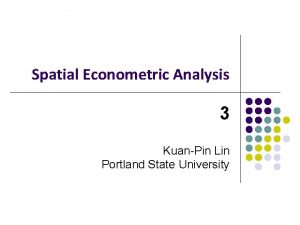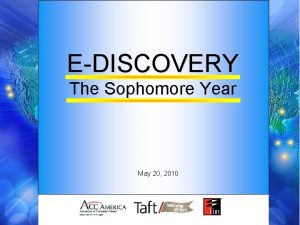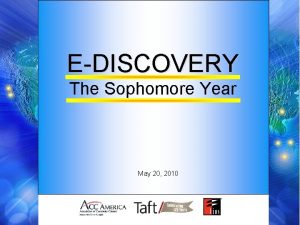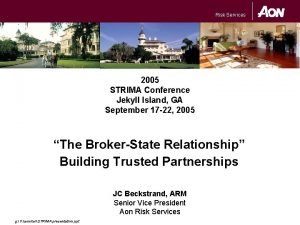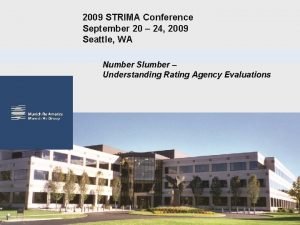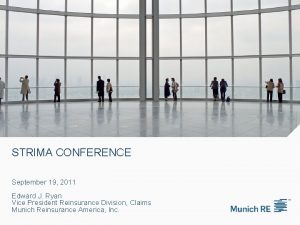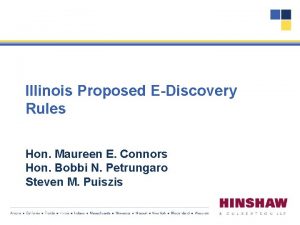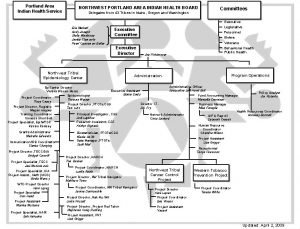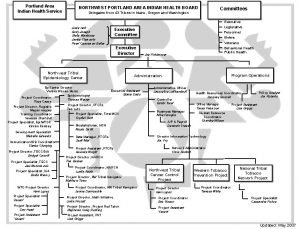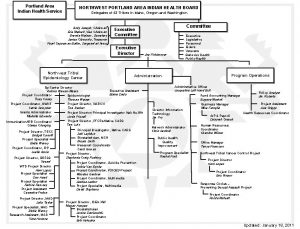EDiscovery 2007 STRIMA Conference Portland Maine New Rules































- Slides: 31

E-Discovery 2007 STRIMA Conference Portland, Maine New Rules of Civil Procedure Lucy Isaki State Risk Manager Senior Assistant Director/Legal Counsel Office of Financial Management State of Washington September 11, 2007

Federal Rules of Civil Procedure Nut Shell Version Post 12/2006 Rule 34(a): Specifically calls out “electronically stored information” as within the scope of documents that may be inspected, copied, tested or sampled. Rule 34(b): Production Format n Allows the requesting party to specify production format for electronic documents (i. e. , native format, tiff or in an online repository). n When the production format is not specified or if the responding party objects to the requested format, the responding party must state its preferred production format. n The default production format may be either a form (or forms) in which the information is “ordinarily maintained” or in a “reasonably usable” form. 09/11/2007 2

Ordinarily Maintained Productions may Include Intact Metadata Unless: § Irrelevant § The producing party timely objects to the metadata production, § The parties agree not to produce metadata, or § The producing party requests a protective order. Williams v. Sprint/United Mgmt Co. , 230 F. R. D. 640 (D. C. Kan. 2005). § Review Sedona Conference ® - Thoughts About Metadata Appendix E – Technical Appendix on Metadata 09/11/2007 3

Parties who fail to preserve and produce metadata may be at risk for judicial sanctions. § A magistrate found an accounting firm had to have known multiple database versions existed and the hard copy production failed to capture relevant database components, such as metadata. § He recommended default judgment declaring “[n]o reasonable person could believe that Pw. C’s production…to Telxon…was a ‘good faith’ production. ” Hayman v. Price. Waterhouse. Coopers, LLP (In re Telxon Corp. Sec. Litig. ), 2004 09/11/2007 U. S. Dist. Lexis 27295 (N. D. Ohio July 2, 2004). 4

Federal Rules of Civil Procedure Rule 26(b)(2)(B): Production of Reasonably Accessible Information § A party does not have to produce electronic information that is “not reasonably accessible. ” § The test for reasonable accessibility based on the “undue burden or cost” of producing the information. 09/11/2007 5

Federal Rules of Civil Procedure Rules 16(b), 26(f), and Form 35: Handling E-Discovery Concerns Rule 16(b), Rule 26(f), and Form 35 direct counsel to discuss early on how to handle e-discovery issues, including decisions relating to privilege claims. 09/11/2007 6

Federal Rules of Civil Procedure Rule 26(b)(5)(B): Inadvertent Production of Privileged Information § Addresses inadvertent production of privileged or trial-preparation information. The receiving party may not use the data until the waiver claim has been resolved. § If the information was disclosed before the receiving party was notified, the receiving party must take reasonable steps to retrieve it. 09/11/2007 7

Federal Rules of Civil Procedure Rule 37(f): Routine, Good-faith Sanctions Test § Reprieve from sanctions if: Information was lost as a result of the “routine, good-faith operation of an electronic information system. ” § Caution: Even if parties act in good-faith, sanctions may still be permitted in “exceptional circumstances. ” 09/11/2007 8

Duty to Preserve n Arises on “reasonable anticipation” of litigation. n Is it the routine, good-faith operation of an information system to follow usual document retention/destruction policy once you have anticipated litigation? 09/11/2007 9

Courts Say “No”: § As a result of automated deletion, internal emails from key custodians were “irretrievably lost. ” One key custodian testified he was never instructed to preserve relevant communications, even after the lawsuit commenced. § A magistrate recommended an adverse inference instruction and an order allowing the plaintiff to present evidence of spoliation. § “Such normal procedures for destruction of documents must… be suspended when a party is on notice that they may be relevant to litigation, and the failure to make an adequate search of such documents before their destruction may be evidence of bad faith. ” 09/11/2007 Daimler. Chyrsler Motors v. Bill Davis Racing, Inc. , 2005 Lexis 38162 10

Courts Find Failures Indefensible n n Echostar failed to suspend its document retention policy; it did not instruct employees of the litigation hold. Echostar had an “extraordinary” email/document retention policy. Echostar had a duty to preserve when it learned of Broccoli’s employment complaints. Broccoli’s personnel file did not even include evaluations and no email about complaints was preserved. “Given Echostar’s status as a large public corporation with ample financial resources and personnel management know-how, the court finds it indefensible that such basic personnel procedures and related documentation were lacking. ” Broccoli v. Echostar 09/11/2007 Communications Corp. , 229 F. R. D. 506 (D. Md. 2005). 11

There are No Excuses n “Much of present day discovery is contained on computers. It is both parties’ duty to comply with the rules of discovery and court orders despite technical difficulties. ” Shank v. Kitsap County, 2005 Lexis 35202 (W. D. Wash. Aug. 30, 2005). 09/11/2007 12

Preservation Review n Records Retention Policy n n Understand the policies that affect your agency Legal Hold: Plan ahead for retention in the face of “anticipated litigation” Silvestri v. General Motors, 271 F. 3 d 583, 591 (4 th Circuit , 2001) n n IT Inventory Identify Locations of Relevant Information Outline Response Plan – Review with Lawyers to Preserve Information Be Prepared to Respond and Follow-up 09/11/2007 13

Web Resources n www. Thesedonaconference. org (general guidelines) n www. ediscoverylaw. com (case law) n www. Krollontrack. com (cases/alerts/classes) n www. ncsonline. org (State Court Guidelines 2006) 09/11/2007 14

Client Basics – Electronic Document Preservation and Discovery n Court decisions dating back a few years and the December 1, 2006 court rule changes require you to focus on electronic documents that relate to anticipated lawsuits. n Key Concept n All electronic data is potentially discoverable (subject to applicable privileges) including but not limited to, E-mail, other active information stored on servers, and back-up tapes/media capable of restoration even if deleted at some prior time. 09/11/2007 15

Some Key Obligations n n n n Agency must preserve data whenever there is a reasonable anticipation of a lawsuit You must suspend your routine document retention/destruction policy Identify key players who may heave relevant documents Identify all sources (computers, jump drives, Blackberry etc. ) of relevant documents Put a written “litigation hold” in place directing preservation of all the relevant documents wherever located Make your IT department aware of the litigation hold Preserve everything until you can review with counsel any and all decisions including those about subject matter of documents, the key players, the time frame, whether stored data such as back up tapes/media are accessible or inaccessible and how these will be preserved Draft a written preservation plan and review it with counsel – it is your plan and you have the responsibility to see that it is followed. Do not attest that you have made a “diligent search” without a written outline describing what you did. Review that outline with your lawyers – get advice on the adequacy of your efforts 09/11/2007 16

Continuing Obligations n n n Quarterly follow up for the duration of the dispute/lawsuit to be sure that documents are identified and retained on a continuing basis Follow lawyer’s preservation related instructions on an ongoing basis Send periodic written reminders to key players of obligations 09/11/2007 17

Consequences of Failure to Meet Obligations n n n Payment of the opposing party’s legal costs Serious monetary sanctions Preclusion of evidence Adverse inference instructions Default Judgment 09/11/2007 18

e. Discovery Sample Hold Notice Response Plan Lucy Isaki State Risk Manager Senior Assistant Director/Legal Counsel Office of Financial Management State of Washington September 11, 2007

e. Discovery Data Source Inventory n n n n n 1. 2. 3. 4. 5. 6. 7. 8 9. Data Custodian Data Collection Approach Data Custodian Network Configuration Data Custodian Data Sources Data Custodian Agency Assigned Computer(s) Data Custodian Email Data Custodian Mobile Device Use Data Custodian Voice Mail System List all Backup and/or Archive Storage Systems 9/11/2007 20

e. Discovery General Hold Notice Response Process n n n n Establish the preliminary scope and subject matter for hold notice Inform ISD of the Hold Notice and data subjects Issue formal Hold Notice Assign role of “Electronic Data Collection Coordinator” for the case Ensure secure storage areas Follow up on initial Hold Notice Complete the Data Collection Interview with all named staff as soon as possible Monitor on-going data collection efforts 9/11/2007 21

Examples of Custodian Interview Questionnaire n n n n Personal Folder Location? Shared Folder Areas? Removable media? Any GOV data on any non-GOV issued computer? Does the local Hard Disk(s) contain relevant records, documents, or data? Locations of. PST files? Do you use a Blackberry? Do you use a PDA? 9/11/2007 22

Examples of Custodian Interview Questionnaire, cont. n n Do you use a cell phone? Do you use a i. POD or other MP 3? Do you have relevant records, documents, or data from the previous person who held your job? Is there anyone else who may have relevant records, documents, or data that reflect your role in this case? To download e. Discovery Forms go to: http: //www. ofm. wa. gov/rmd/default. asp (Scroll to the bottom of page and click on): OFM EDiscovery Hold Notice Response Plan OFM Hold Notice Worksheet Template OFM Hold Notice Response Process 9/11/2007 23

IT Support for E-Discovery Presented by Greg Mc. Neal September 11, 2007

Document Management The key to e. Discovery is document management. Document management is not an IT function. It is a cooperative effort involving the State Archivist & all state agencies, and is supported by the state’s Information Technology organization. 9/11/2007 25

Document Management All of state government must be involved in implementing a document management solution. The Governor, the Cabinet, the Legislature, the state training department, Risk Management, the agencies and their Records Officers, and the IT organization all support the document management system that allows the Attorney General to respond to e. Discovery requests from plaintiffs. 9/11/2007 26

What is the Role of the IT Organization? The IT Organization § Supports the very diverse missions of state agencies. § Provides technology support (expertise and tools) for records management, including support for E-Discovery requests. § Stores, finds, and retrieves records requested in EDiscovery. [In some states, the Attorney General may have this role. ] § Expertise should include evidence gathering, forensic copying and analysis. [The expertise is often outsourced. ] 9/11/2007 27

What to Do Until You Have a Comprehensive Document Management Solution § Develop records management policies and procedures, including records retention schedules and provisions for records disposition. § Identify participants and their roles in the e. Discovery process. § Attorney General § State Archivist § State Agency Records Manager § Parties to the lawsuit § Information Technology organization § Publish procedures for responding to e. Discovery requests. § Develop good communications links and habits among all parties. 9/11/2007 28

Responding to an E-Discovery Request without a Document Management System Request for e-mail § Maine has a single email system for 13, 000 state employees and must rely on disaster recovery backup tapes for its six mail servers. § Two nightly jobs back up the six servers. When a request for mail is made, the Messaging group must identify the server where the mail is held and request tapes from Operations. § Archive of mail is incomplete, since it is not systematic. Ordinarily, daily incremental backup tapes are saved for one week, full weekly backups are saved for one month, and full monthly backups are saved for one year. § Official records are subject to document retention rules. Records sought in discovery are often not subject to these rules. 9/11/2007 29

Responding to an E-Discovery Request without a Document Management System Request for e-mail (continued) § Maine has stopped overwriting email backup tapes until an email management system can be implemented. At the end of one year, we will be holding over 500 sets of disaster recovery backup tapes. § Based on initial request, IT support staff identifies mail servers and backup tapes, retrieves them from off-site secure storage, restores them to a work server, and creates a pst file for each requested mailbox account for each tape (daily, weekly, monthly). § Each tape requires 1 ½ to 2 hours of hands-on tech support time to restore and process. 9/11/2007 30

Conclusion § The best support for e. Discovery is a good document retention policy. § The state’s IT organization should provide technical solutions to support business requirements of the agencies, including document retention. For email management, the IT organization should be able to provide a single instance storage solution with sophisticated search capability. § Managing electronic documents and responding to e. Discovery requests are responsibilities shared by many entities across state government. § Only by acknowledging these shared responsibilities and working together can the solutions be identified and implemented. 9/11/2007 31
 Strima conference
Strima conference Strima conference
Strima conference Hard rock maine
Hard rock maine Dhhs portland maine
Dhhs portland maine Scortportland
Scortportland Walters restaurant portland maine
Walters restaurant portland maine Ch robinson queretaro
Ch robinson queretaro Strima world
Strima world Strima
Strima Strima
Strima Strima.word
Strima.word Freddie strima
Freddie strima Ediscovery bexar county
Ediscovery bexar county Esi data mapping
Esi data mapping Project management tools for ediscovery and litigation
Project management tools for ediscovery and litigation Europe healthcare archiving and ediscovery market outlook
Europe healthcare archiving and ediscovery market outlook Ediscovery unindexed items
Ediscovery unindexed items Kendall and marzano taxonomy
Kendall and marzano taxonomy Irca part 3
Irca part 3 Third party risk management conference 2019 new york
Third party risk management conference 2019 new york What happened in chapter 10 of animal farm
What happened in chapter 10 of animal farm Psu scholarship universe
Psu scholarship universe Portland state university undergraduate tuition and fees
Portland state university undergraduate tuition and fees Portland japantown
Portland japantown Manufacture of portland cement
Manufacture of portland cement Honor flight portland oregon
Honor flight portland oregon Colocation portland
Colocation portland Clinker di portland
Clinker di portland The burnside triangle
The burnside triangle Fluxograma processo de fabricação do cimento
Fluxograma processo de fabricação do cimento Bruce whitman portland
Bruce whitman portland Shac portland state
Shac portland state








